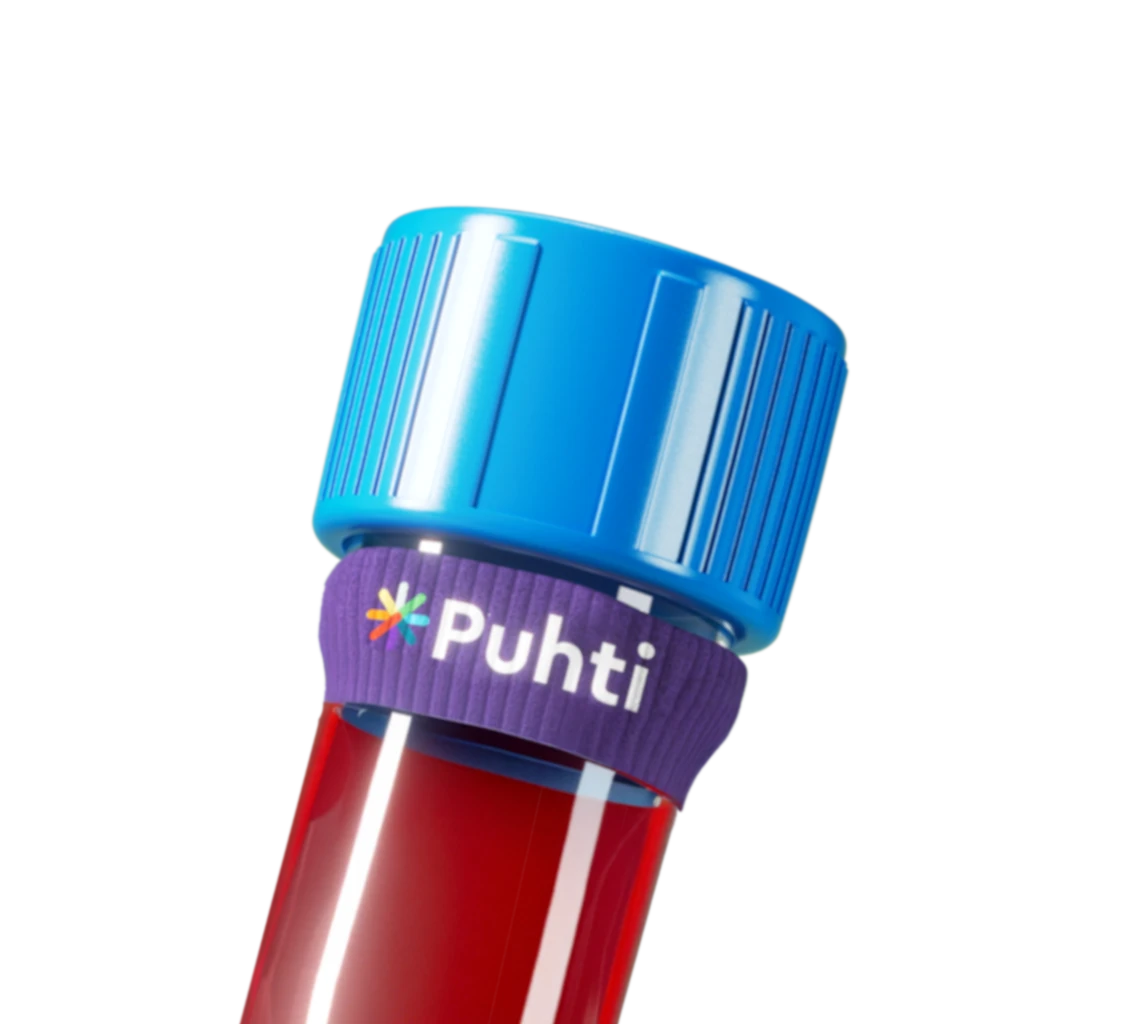
Preparing for a blood test – instructions before sample collection
Preparing for a blood test may require, for example, fasting or leaving out some medications. Not taking medications should be discussed with your doctor.

Preparing for a blood test – instructions before sample collection
Preparing for a blood test may require, for example, fasting or leaving out some medications. Not taking medications should be discussed with your doctor.
Before a blood test
- Do not visit the laboratory if you are ill.
- Avoid alcohol and smoking the day before the test.
- Most of the Puhti test packages do not require fasting.
- However, fasting is required for some tests. If your test requires fasting, you should not eat or drink for 8–12 hours before the test.
Puhti handles all of your laboratory test needs without a doctor’s referral. On this page, you will find instructions for testing and, for example, fasting.
It is important to prepare for your blood tests correctly so that the results will be reliable and useful.
Please note that the methods of analysis, test codes and instructions may vary, depending on the laboratory. Puhti test samples are collected and analysed at the laboratories of Mehiläinen.
Preparing for a blood test
We take care of the well-being and safety of our customers and staff. Do not visit the laboratory if you are ill. The order placed on the Puhti website is valid for one year, and you can visit the laboratory for testing when it suits you and when you are healthy.
Food and stimulants before testing
Usually, a blood test can be taken, no matter what or when you have eaten. A light meal may be eaten prior to the test, but caffeinated beverages (coffee or tea) should be avoided.
If the test requires fasting, it is mentioned on the product page. Most of the Puhti test packages do not require fasting.
Alcohol and smoking before a blood test
Avoid alcohol and smoking the day before the test. Stimulants can affect the body’s hormone and enzyme levels, blood glucose and fluid balance, among other things.
Exercise before a blood test
Intense exercise can affect the results. We recommend avoiding heavy physical exertion during the 24 hours before the test. Exercise changes blood plasma volume, metabolism and cell permeability. This affects the levels of glucose and various hormones, among other things.
Supplements before a blood test
We recommend avoiding supplements the day before the test, as they may distort the test results. It is advisable to pause iron supplements 1-2 weeks before sampling when examining iron stores.
Creatine used as a dietary supplement can increase creatinine levels. Those taking creatine as a supplement should take a week off before sampling.
It is recommended to pause biotin the day before the sample collection, as it may interfere with DHEAS and SHBG analyses.
Medicines before a blood test
As a rule, medicines prescribed by the doctor may be taken as usual before the test. Not taking your medication should be discussed with your attending doctor prior to testing.
If you are having testosterone replacement therapy and using a topical gel, you need to avoid applying the gel on your forearms before testing. Testosterone gel on the forearm may yield incorrect testosterone test results.
Thyroid medication and TSH
The sample is taken before the thyroid medicine or four hours after taking the medicine. The concentration is the most even between 10 a.m. and 8 p.m.
Fasting before a blood test
Many of the Puhti test packages do not require fasting. You can find detailed information on the product page in the Puhti online. However, fasting is required for some blood tests. If your test requires fasting, you should not eat or drink for 8–12 hours before the test. Do not fast for longer than 14 hours. Tests that require fasting are usually carried out in the morning after an overnight fast.
Avoid drinking a lot of water or soft drinks when fasting before a test. As the test may be affected by alcohol, coffee, tea and tobacco, please avoid them even when fasting. In the morning before the test, you can drink a glass of water and take the necessary medicines (do not skip your medication without your doctor’s advice).
However, do not fast unless specifically instructed to do so in the instructions for the test.
Fasting-required blood tests
If you add individual tests to a ready-made test package, you can identify fasting-required tests by the small ‘f’ in front of the test abbreviation (for example, folate, fS-Folate). If your order includes even one fasting-required test, fast before the sample collection.
Fasting-required tests in Puhti’s selection are:
- Glucose, blood sugar (fP-Gluk)
- Folate (fS-Folate)
- Transferrin iron saturation (fS-TrFeSat)
- Parathyroid hormone (fP-PTH)
- Transferrin (fS-Transf)
- Iron (fP-Fe)
- Urea (fP-Urea)
- Phosphate (fS-Pi)
- Vitamin B6 (fB-B6-Vit)
- Growth hormone (fS-GH)
- Vitamin A (fS-A-vit)
- Vitamin E (fS-E-Vit)
- Vitamin B1 (fB-B1-Vit)
- Vitamin B2 (fB-B2-Vit)
The following Puhti test packages require fasting:
- Laboratory package Pregnancy
- Laboratory package Iron Deficiency Plus
- Laboratory package for vegetarians and vegans
- Iron Absorption Test – Laboratory Package
- Fasting glucose and cholesterol levels (not individual cholesterol test or in other test packages)
- Super Puhti packages
- Vitamin test package
Take a seat and calm down before testing
Before testing, we recommend that you sit still for about 15 minutes to allow your blood circulation to stabilise.
How to prepare for a follow-up test?
Try to sleep, eat, drink, exercise and work normally during the days before the test. Intense stress or sorrow, for example, can significantly affect the values.
Tests requiring a specific time of day
Some blood tests must be carried out at a specific time of day. The functioning of the body and the concentration of hormones and compounds in the body vary according to the time of day, which is why it is important to test them at the recommended time. See the detailed instructions in the email you received after placing your order or on the product pages of the Puhti online store. You can book an appointment at the Mehiläinen laboratory if you have a test or a test package that requires a certain time of day.
Puhti tests requiring a specific time of day:
- testosterone (free-calculated or total); between 7 a.m. and 10 a.m.
- cortisol (S-Korsol) morning sample at 6–10 AM
- iron (fP-Fe) at 7–9 AM
- transferrin iron saturation (fS-TrFeSat) at 7–9 AM
- prolactin (S-PRL) after two hours of being awake, preferably at 10 AM–2 PM
- Anti-Müllerian hormone (AMH) The measurement is usually done at the beginning of the natural menstrual cycle. The test should not be done if using combination contraceptives like birth control pills, rings, or patches. In this situation, preparation instructions must be checked with a doctor. It is often necessary to pause the use of combination contraceptives. With biotin medication at a dose over 5 mg/day, the sample should be taken 8 hours after the medication dose. The test should not be done if breastfeeding.
- Chlamydia and gonorrhea from the throat. Recommendation for a morning sample. Before sampling, avoid eating and drinking (about 1 hour before sampling). Also, avoid nicotine products and throat lozenges.
- Pregnancy test from urine. A morning sample is recommended. Avoid excessive drinking before sampling, as excessive drinking dilutes the urine and can cause a false negative.
- TSH. The sample is taken before thyroid medication or four hours after taking the medication. The concentration is most stable between 10 AM and 8 PM.
- Follicle-stimulating hormone FSH. The test is taken at the beginning of the natural menstrual cycle (days 3–5 of the cycle). When using hormonal contraceptives (e.g., birth control pills, mini-pills, or implants), the result does not reflect the body’s normal hormonal function. The recommendation is to perform the test at least 4 weeks after stopping the use of contraceptives.
- Luteinizing hormone LH. The test is taken at the beginning of the natural menstrual cycle (days 3–5 of the cycle). The recommendation is to perform the test at least 4 weeks after stopping the use of contraceptives.
The following Puhti test packages require sampling between 7–10 AM due to testosterone:
- Extensive Puhti laboratory package (men)
- Laboratory package Puhti Super (man)
- Laboratory package Sport (men)
- 50+ man laboratory package
Iron Absorption Test – The laboratory package requires sampling before 10:00 AM
- The study of iron absorption is conducted in Mehiläinen laboratories (excluding Felicitas, Synsam, Mehiläinen public health centers, and occupational health offices).
- An appointment for this study should be booked through Mehiläinen’s appointment system.
- Book a morning appointment at the laboratory before 10 AM, when the first sample is taken.
- When you come to the examination, you must bring the study medication (Spartofer 200 mg) with you.
- The study lasts 2 hours. Two blood samples are taken during the study; after the first, you will receive an iron dose. Please note that you cannot leave the laboratory or consume snacks or coffee during the test, as they affect iron absorption.
- Pause iron medication 3–4 days before the test.
- Medications affecting iron absorption, such as antibiotics (fluoroquinolones, tetracyclines, doxycycline), thyroxine, bisphosphonates, Parkinson’s medications (levodopa/carbidopa), and calcium, should be taken at least three hours before the test or after the test.
- You should fast for at least 10 hours before sampling. In the morning, you may take a glass of water with medications if needed.
- The test should not be conducted during an acute illness (e.g., cold) or inflammation, as ferritin does not reliably reflect iron stores, affecting result interpretation. Please come for sampling only when healthy. Contact Mehiläinen’s appointment system if you wish to reschedule.
Laboratory package Iron Deficiency Plus
Note! It is advisable to pause iron supplements 1-2 weeks before sampling.
Sexually Transmitted Disease Tests
Chlamydia and gonorrhea from a urine sample: First urine, no washing before sampling. You must not urinate for 2 hours before sampling.
Sampling instructions for STHLM3 test
The study does not require fasting. The test can be done at any time of the day. Additional information is collected during sampling for the study. Be prepared to answer the following questions in the laboratory:
- Your age?
- Have you had a prostate biopsy (where no cancer was found)? When?
- Has a close relative (father, brother, son) had prostate cancer?
- Are you using medication: 5-alpha-reductase inhibitor (trade names such as Finasteride, Gefina, Proscar, Dutasteride, Dutester, Avodart, or Duodart)?
Stool Sample
To collect a sample (calprotectin and salmonella), you need to pick up a sample container from the laboratory. The sample is taken at home. Sampling equipment and instructions are provided at the laboratory. 1-5 g of stool (a teaspoon, no more than half the volume of the sample container) in a well-sealed stool sample container. The outside of the container must be clean. The container is packed in a tight plastic bag. It can be stored for 3 days in the refrigerator, sent at room temperature.
Note! For the Calprotectin test (F-Calpro), avoid using anti-inflammatory drugs for a couple of weeks before testing, as they can distort calprotectin results by giving a false positive.




